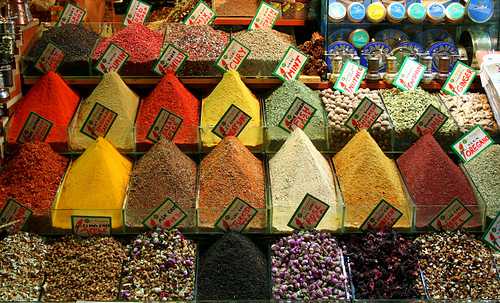By Anita Choudhary
As well as being the most populous city in Turkey, Istanbul is also known as the country’s cultural and financial center. It is referred to as the bridge between the Asian and European continents as it is situated on both sides of Bosphorus Strait which links the Black Sea with the Marmara Sea. In 2010, Istanbul was listed as one of the three cultural capitals of Europe. The city is also the home of some excellent shopping opportunities. Listed below are some of Istanbul’s best street markets to explore when visiting the city.

Spice Bazaar – since 1664, the Eminönü Egyptian Spice Bazaar has been referred to as a gastronomic paradise by those who enjoy the use of numerous spices while practicing their culinary expertise. This is the best place for finding a number of different food items and spices seven days a week. Here you will find a wide variety of dried fruits, essences, nuts, oils, and olives while the air is filled with the scent of Mehmet Efendi coffee that has just been freshly ground.
Fatih Çarşamba Market – located in one of the more conservative areas of Istanbul, this Wednesday-only affair features brand name clothing, cured meats, eggs, fruits and vegetables, and all types of gadgets, all of which can be purchased at extremely affordable prices. The market is not for the faint of heart as it is a disorganized and unruly affair where it is not uncommon to see numerous vendors standing atop their product tables and bellowing out the prices of their items.
Inebolu Sunday Market – located in the Kasimpaşa district of grimy downtown Beyoğlu, this is what would easily be called the traditional culinary carnival of Anatolia. You will find numerous booths laden with bins of olives, bright and colorful flowers, chunky corn bread slabs, eggs by the crate, fragrant herbs by the bushel, and sacks filled with grains, hazelnuts, or walnuts. It opens at 6 am and oftentimes closes by 4 pm.
Yeşilköy (green village) Market – if you’re searching for a street market that operates at a less frantic, more relaxed pace, Yeşilköy is just the ticket. Greenery is abundant and this Wednesday-only venue has the reputation of only offering the finest, high-quality items at the most reasonable prices possible. There are 2,000 vendor stalls and the market even has toilet facilities if you need them. Additionally, there is tea cafés located throughout the market when you want to take a break from all the browsing.
Çarşamba – The Wednesday market, better known as Fatih Çarşamba has a huge fruit, branded clothes, vegetables, gadgets, eggs and cured meat at amazingly low rates. Although it is extremely interesting, all of the sellers sell on tables in bags but completely disorganized and chaotic. But it is mostly a locals market, you need to bargain and haggle to get a good deal. .
via Istanbul’s Best Street Markets | Venere Travel Blog.


